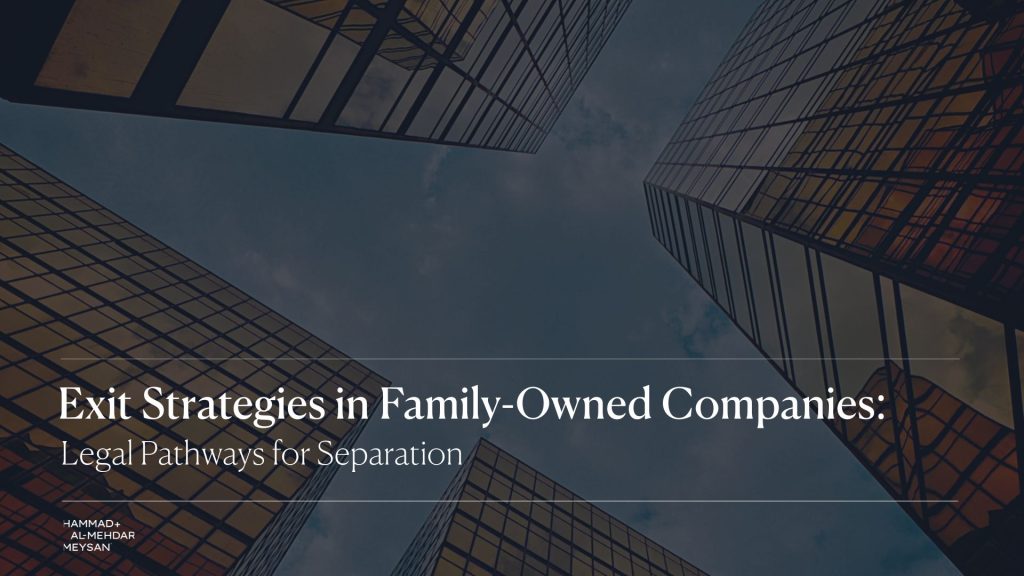
Family-owned companies remain a cornerstone of economic development in Saudi Arabia and across the broader Middle East. Rooted in deep personal ties and shared long-term goals, these enterprises often evolve from informal arrangements into sophisticated multi-generational structures. As businesses mature and family dynamics shift, some members may inevitably wish to reduce or end their involvement. In such cases, a legally sound and well-governed exit strategy is essential. It not only safeguards business continuity but also helps preserve family harmony.
Understanding Exit Scenarios in Family Businesses
An exit in a family-owned business involves the departure of a family member from ownership, management, or both. These exits can be planned, such as through retirement or generational transition, or they may arise from disputes, divergent business priorities, or personal financial goals. Unlike exits in public or widely held companies, family business separations carry emotional, cultural, and reputational dimensions that must be addressed delicately and strategically.
Legal Foundations for Exit Planning
1. Shareholder Agreements
A detailed shareholder agreement is the legal backbone of a sustainable exit plan. It sets out the rights and obligations of each shareholder and provides mechanisms for resolving disputes and managing exits. In family-owned structures, these agreements should also address unique concerns such as:
- Exit scenarios and triggering events
- Valuation methods and appointment of independent experts
- Transfer restrictions and approval protocols for non-family buyers
- Protections to keep ownership within the family circle
- Roles of non-operational family shareholders
By documenting these matters clearly, the agreement reduces ambiguity and the potential for intra-family disputes.
2. Memorandum and Articles of Association (MOA and AOA)
The constitutional documents of the company must align with the shareholder agreement. They serve as the legally binding reference for governance, share transfers, voting rights, and dispute resolution. In Saudi Arabia, any amendments to these documents must comply with the 2022 Companies Law and be registered with the Ministry of Commerce via the Qiwa or Meras platforms, as applicable.
3. Valuation Mechanisms
Disagreements over valuation are a common source of tension during exits. To avoid this, family businesses should pre-define valuation methodologies in their legal documents. Options include:
- Net asset or book value
- Earnings-based or EBITDA multiples
- Discounted cash flow (DCF)
- Independent third-party valuation
Consistency, transparency, and fairness are key to maintaining trust and enabling smooth transactions.
Legal Pathways for Exiting a Family-Owned Business
1. Buy-Sell Agreements
These agreements create binding arrangements that dictate how shares are to be handled under specific circumstances, such as death, disability, retirement, or voluntary exit. They provide financial predictability and help keep ownership within the designated circle of shareholders.
2. Family Settlement Agreements
When disputes emerge or when there is a mutual decision to separate, family settlement agreements can be used to redistribute shares or reassign responsibilities. These agreements are enforceable under Saudi law and typically include:
- Confidentiality clauses
- Non-compete obligations
- Waivers of future claims
- Clear transfer terms
They offer a private, practical resolution while preserving family relationships.
3. Company Share Buybacks
Under the Companies Law, a limited liability company (LLC) or a joint stock company (JSC) may repurchase its shares, subject to regulatory compliance and capital requirements. This may be preferable when other shareholders are not in a position to acquire the exiting member’s interest. The company must ensure adequate liquidity and must follow the Ministry of Commerce notification procedures.
4. Corporate Restructuring and Spin-Offs
For family groups operating across multiple sectors, corporate restructuring offers an alternative to direct exits. A spin-off or demerger can allocate separate business units to different branches of the family. This allows for operational independence while preserving shared legacy and group identity. Such strategies require careful tax and regulatory planning and may involve approvals from the Zakat, Tax and Customs Authority (ZATCA) and the Ministry of Commerce.
5. Third-Party Sale
Though typically a last resort in family businesses, external sales may become necessary when internal options are exhausted. Protective mechanisms in the shareholder agreement, such as:
- Rights of first refusal
- Tag-along rights
- Drag-along rights
Regulatory disclosures and anti-competition laws must also be considered when selling to third parties.
Aligning Exit with Succession Planning
Exit planning and succession planning should be viewed as two sides of the same coin. The exit of a senior family member often coincides with the need to elevate the next generation. Establishing a formal family council or advisory board helps manage expectations and provide a structured forum for communication and dispute resolution. Legal alignment between succession and exit frameworks ensures continuity and prepares the business for long-term sustainability.
Legal Due Diligence and Risk Management
Before any exit is finalised, thorough legal due diligence is critical. This process should include:
- Verification of share ownership and compliance history
- Review of all corporate documents, shareholder agreements, and minutes
- Tax liabilities and potential exposure
- Intellectual property and asset entitlements tied to the exiting member
- Review of any personal guarantees or outstanding obligations
In recent years, the Saudi legal landscape has evolved significantly, particularly with the new Companies Law and increasing regulatory scrutiny. Legal due diligence ensures that all exits are legally valid, commercially reasonable, and compliant with current regulations.
Looking Ahead
In Saudi Arabia, family businesses continue to grow in sophistication, size, and complexity. As such, the need for structured and legally robust exit pathways has become more important than ever. A proactive approach to planning including clear documentation, legal enforceability, and alignment with business strategy helps avoid costly disputes and protects both commercial and personal interests.
Legal advisors play a key role in guiding families through this process, offering solutions that reflect not just legal compliance, but also cultural understanding and emotional sensitivity. With the right frameworks in place, family businesses can navigate separations gracefully and remain resilient across generations.
